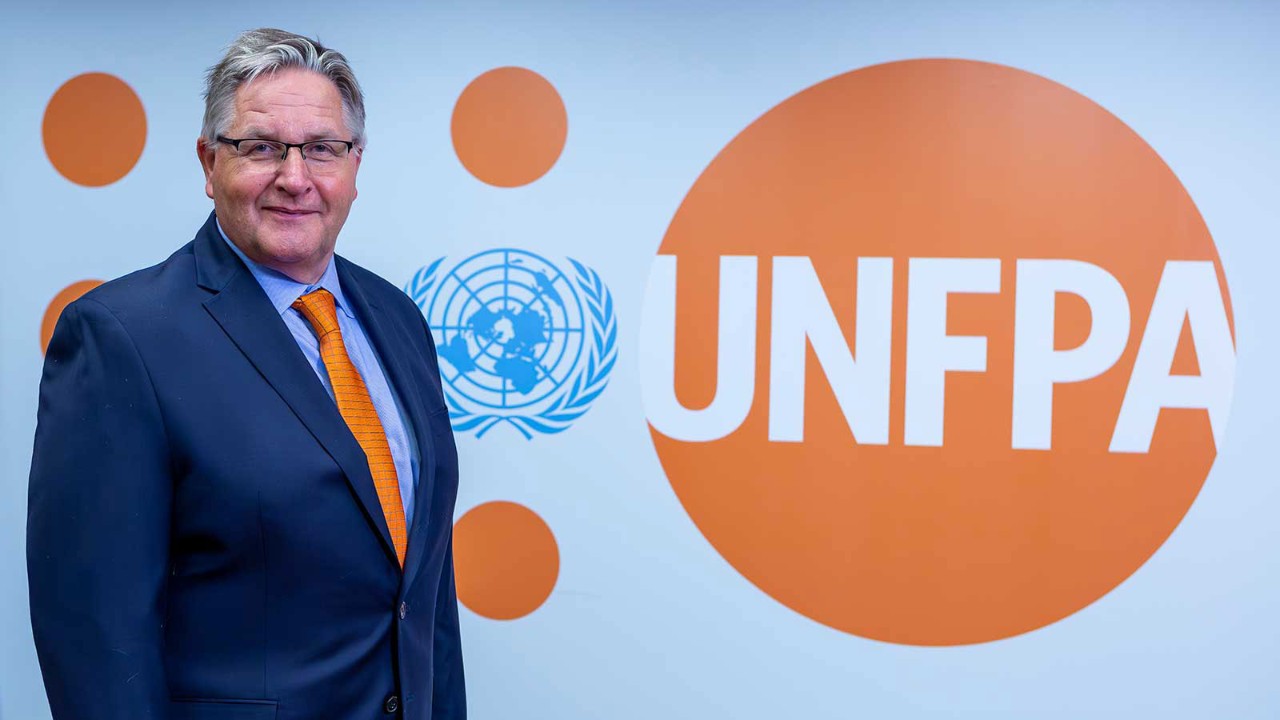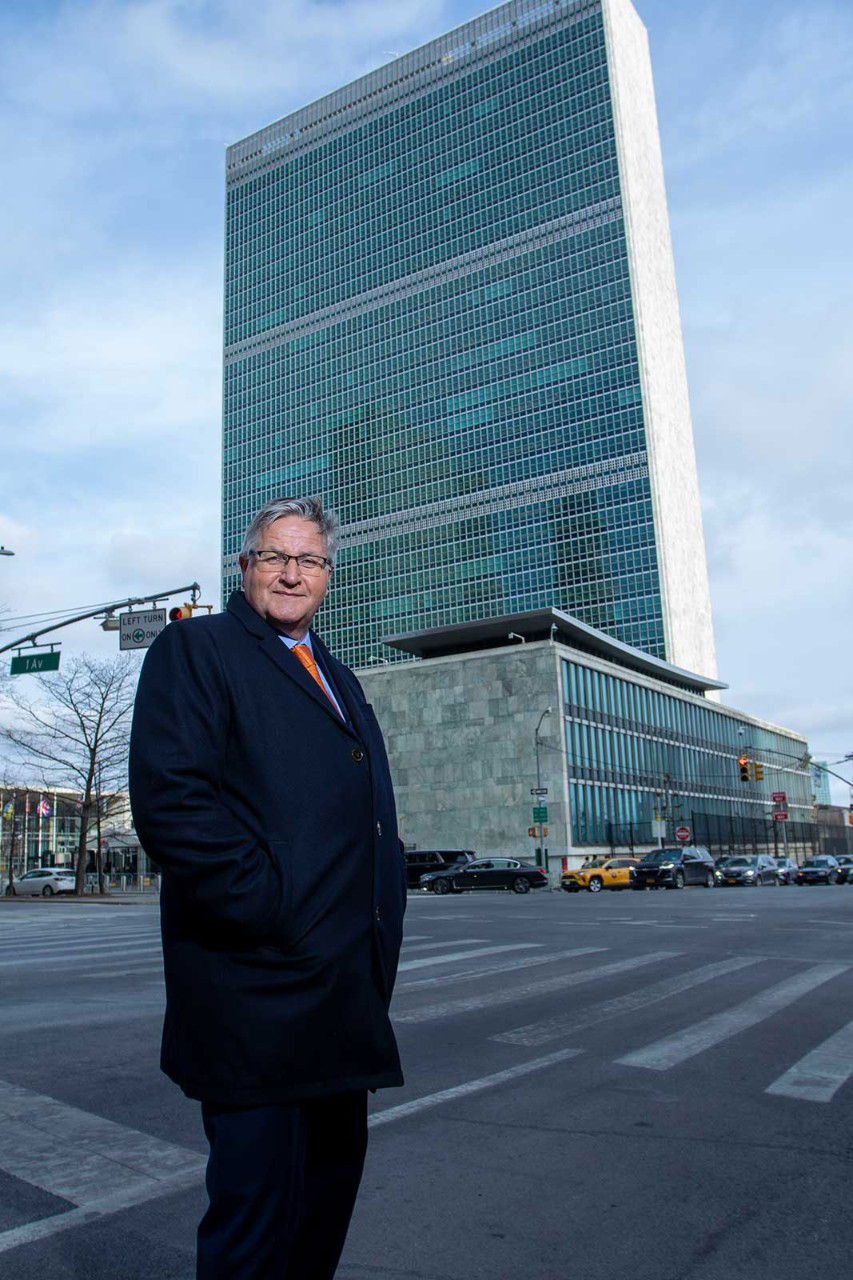
Andrew Saberton FCCA, assistant secretary general and deputy executive director of the United Nations Population Fund (UNFPA), has staff operating in some of the world’s most hostile environments, including Gaza, Haiti, Sudan and Ukraine. He does not go into detail but weighing up the risk of operating in such dangerous areas is a key part of his job.
These are not the only difficult locations for UNFPA staff but they illustrate the high stakes involved in helping manage the agency. Its services are aimed at improving women’s sexual and reproductive health and rights around the world, and protecting them from gender-based violence and other harmful practices.
‘It gets in your blood because the mandate is so emotive’
The dangers are front of Saberton’s mind. ‘They’re risky decisions. I have to deal with that risk every day and so do my staff. Ultimately, we are trying to help the beneficiaries, save lives and improve people’s lives. If you can do that in any way and manage the risk, then let’s do it.’
The route up
That kind of decision-making is a long way from where Saberton started. He had just four O levels when he left school at 16 to work in a shop selling power tools in Ely, Cambridgeshire. He studied through day-release and at night school for the ACCA qualification and became a fellow in 1997.
Meanwhile work progressed. He left retail to join Thomas Cook Group in 1987 where he worked in various accounting roles. In 1998 he began a three-year stint as a consultant with enterprise software firm Agresso, and clients included the International Atomic Energy Agency (IAEA) and the United Nations Industrial Development Organisation (UNIDO) – a specialised UN agency that assists countries in economic and industrial development.
‘It’s the best job I’ve ever had and it gets better every day’
It was while there Saberton realised his vocation lay with the public sector and its mission. He was hired by UNIDO in 2001 as senior finance officer and worked there for eight years, based in Vienna. When an opportunity arose at UNFPA, he got the job and moved to Manhattan in 2009. He has been there ever since, as chief of the accounts section, chief of the finance branch, and then comptroller and director of the division for management services from 2016. He took up his current post in January this year.
A calling
Only a brief time with Saberton reveals him as a true cheerleader for the organisation. He talks at length and with zeal about its work and mission. ‘It’s the best job I’ve ever had and it gets better every day,’ he says, adding quickly: ‘It’s not so much a job as a calling.’
It’s easy to see why. The agency has a three-part mission: to provide family planning and to prevent maternal death and gender-based violence. To do this, UNFPA has a budget of US$1.5bn – met mainly by voluntary donations from 100 UN member states – and around 5,000 personnel, and operates in 130 countries.
‘I no longer know what motivated me to work to earn big profits for shareholders’
UNFPA uses a human-rights-based approach to advocate and campaign to change norms and by directly providing services. It provides many of these itself, but about 30% are delivered through around 1,800 partner organisations, many of which are small, local community-based and women-led groups familiar with local customs and culture.
Saberton’s focus, however, is overwhelmingly the mission. ‘It gets in your blood because the mandate is so emotive,’ he says. ‘I know all my colleagues feel exactly the same. We are making a difference, we really are. We come to work, and we can make a difference.’
Reflecting on his time spent working for companies he adds: ‘I no longer know what encouraged or motivated me to get out of bed in the morning and go to work to earn big profits for my shareholders in the private sector.’
Saberton is not only in charge of finance. He also leads HR, IT, supply chain management and procurement, humanitarian response, security, change management, admin facilities and partner assurance. ‘It’s a very big remit,’ he says wryly.
‘I have to do everything I can to make sure every dollar gets to the ultimate beneficiaries’
Great responsibility
Big responsibilities attract big risk. The funding of UNFPA by voluntary donations makes Saberton acutely aware that the organisation has to be transparent and accountable and that he has to ensure money is spent where it is supposed to be spent.
He leads a four-year planning and budgetary process across two streams: one for ‘earmarked’ projects (those that donors have specifically provided money for), and non-earmarked (the agency’s broad missions).
The money is then allocated across three budgets: institutional (management and overhead costs), cross-border programmes and country programmes. A resource allocation system is used to allocate funds across countries. Each individual project has to have a work plan signed off by managers before any money is distributed.
‘We should be building resilient societies, not ones that fall over the moment the UN leaves’

Then there are the standard three lines of defence applied to internal controls and even ‘last mile’ assurance – ensuring that critical supplies reach their intended destination with spot checks. Saberton calls the risk management a ‘very extensive thing’.
‘I have to do everything I can to make sure every dollar gets to the ultimate beneficiaries, that we don’t lose it in inefficiency, overheads or fraud.’
Pragmatism
Even so, because of the humanitarian mission, Saberton concedes there are big departures from normal financial management that would probably make private sector accountants blanch. One example is local delivery partners, perhaps a local health ministry that ‘may not be ideal’ but the only option if services are to be delivered. In those cases, the mission changes somewhat.
‘It’s about talking to them, capacity building, and improving their controls and flexing ours,’ Saberton says. ‘It’s a different way of doing things, but it’s worth doing. We should be building resilient societies, not ones that fall over the moment the UN leaves.’
With donors keeping an eagle eye on how their money is spent, it might be natural for Saberton to have sleepless nights. But he says he never does. ‘I’m too tired,’ he jokes. But he adds: ‘Every staff member is making sure they’re doing everything they can to deliver effectively to the women and girls we serve, and to improve efficiency because we are under constant pressure from our member states.
‘It doesn’t keep me awake at night because I think we are continually looking to strengthen our work, and we are on a continuous learning path’
Career navigator
In the evolving landscape of finance careers, finding your path can be a challenge. ACCA’s relaunched Career Navigator offers the tools needed to set you on the route to success. Discover roles that are relevant to your current skillset, plan for future opportunities and equip yourself to get there.



